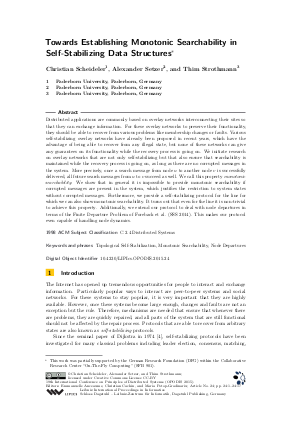Towards Establishing Monotonic Searchability in Self-Stabilizing Data Structures
Authors Christian Scheideler, Alexander Setzer, Thim Strothmann
-
Part of:
Volume:
19th International Conference on Principles of Distributed Systems (OPODIS 2015)
Part of: Series: Leibniz International Proceedings in Informatics (LIPIcs)
Part of: Conference: International Conference on Principles of Distributed Systems (OPODIS) - License:
 Creative Commons Attribution 3.0 Unported license
Creative Commons Attribution 3.0 Unported license
- Publication Date: 2016-10-13
File

PDF
LIPIcs.OPODIS.2015.24.pdf
- Filesize: 0.53 MB
- 17 pages
Document Identifiers
Subject Classification
Keywords
- Topological Self-Stabilization
- Monotonic Searchability
- Node Departures
Metrics
- Access Statistics
-
Total Accesses (updated on a weekly basis)
0PDF Downloads0Metadata Views
Abstract
Distributed applications are commonly based on overlay networks interconnecting their sites so that they can exchange information. For these overlay networks to preserve their functionality, they should be able to recover from various problems like membership changes or faults. Various self-stabilizing overlay networks have already been proposed in recent years, which have the advantage of being able to recover from any illegal state, but none of these networks can give any guarantees on its functionality while the recovery process is going on. We initiate research on overlay networks that are not only self-stabilizing but that also ensure that searchability is maintained while the recovery process is going on, as long as there are no corrupted messages in the system. More precisely, once a search message from node u to another node v is successfully delivered, all future search messages from u to v succeed as well. We call this property monotonic searchability. We show that in general it is impossible to provide monotonic searchability if corrupted messages are present in the system, which justifies the restriction to system states without corrupted messages. Furthermore, we provide a self-stabilizing protocol for the line for which we can also show monotonic searchability. It turns out that even for the line it is non-trivial to achieve this property. Additionally, we extend our protocol to deal with node departures in terms of the Finite Departure Problem of Foreback et al. (SSS 2014). This makes our protocol even capable of handling node dynamics.
Cite As Get BibTex
Christian Scheideler, Alexander Setzer, and Thim Strothmann. Towards Establishing Monotonic Searchability in Self-Stabilizing Data Structures. In 19th International Conference on Principles of Distributed Systems (OPODIS 2015). Leibniz International Proceedings in Informatics (LIPIcs), Volume 46, pp. 24:1-24:17, Schloss Dagstuhl – Leibniz-Zentrum für Informatik (2016)
https://doi.org/10.4230/LIPIcs.OPODIS.2015.24
BibTex
@InProceedings{scheideler_et_al:LIPIcs.OPODIS.2015.24,
author = {Scheideler, Christian and Setzer, Alexander and Strothmann, Thim},
title = {{Towards Establishing Monotonic Searchability in Self-Stabilizing Data Structures}},
booktitle = {19th International Conference on Principles of Distributed Systems (OPODIS 2015)},
pages = {24:1--24:17},
series = {Leibniz International Proceedings in Informatics (LIPIcs)},
ISBN = {978-3-939897-98-9},
ISSN = {1868-8969},
year = {2016},
volume = {46},
editor = {Anceaume, Emmanuelle and Cachin, Christian and Potop-Butucaru, Maria},
publisher = {Schloss Dagstuhl -- Leibniz-Zentrum f{\"u}r Informatik},
address = {Dagstuhl, Germany},
URL = {https://drops.dagstuhl.de/entities/document/10.4230/LIPIcs.OPODIS.2015.24},
URN = {urn:nbn:de:0030-drops-66135},
doi = {10.4230/LIPIcs.OPODIS.2015.24},
annote = {Keywords: Topological Self-Stabilization, Monotonic Searchability, Node Departures}
}
Author Details
References
-
James Aspnes and Yinghua Wu. O(logn)-time overlay network construction from graphs with out-degree 1. In Principles of Distributed Systems, 11th International Conference, OPODIS 2007, Guadeloupe, French West Indies, December 17-20, 2007. Proceedings, pages 286-300, 2007.

-
Andrew Berns, Sukumar Ghosh, and Sriram V. Pemmaraju. Building self-stabilizing overlay networks with the transitive closure framework. Theor. Comput. Sci., 512:2-14, 2013.

- Tushar Deepak Chandra and Sam Toueg. Unreliable failure detectors for reliable distributed systems. J. ACM, 43(2):225-267, 1996. URL: http://dx.doi.org/10.1145/226643.226647.
-
Edsger W. Dijkstra. Self-stabilizing systems in spite of distributed control. Commun. ACM, 17(11):643-644, 1974.

-
Shlomi Dolev and Ronen I. Kat. Hypertree for self-stabilizing peer-to-peer systems. Distributed Computing, 20(5):375-388, 2008.

-
Shlomi Dolev and Nir Tzachar. Spanders: Distributed spanning expanders. Sci. Comput. Program., 78(5):544-555, 2013.

-
Dianne Foreback, Andreas Koutsopoulos, Mikhail Nesterenko, Christian Scheideler, and Thim Strothmann. On stabilizing departures in overlay networks. In Stabilization, Safety, and Security of Distributed Systems - 16th International Symposium, SSS 2014, Paderborn, Germany, September 28 - October 1, 2014. Proceedings, pages 48-62, 2014.

- Dominik Gall, Riko Jacob, Andréa W. Richa, Christian Scheideler, Stefan Schmid, and Hanjo Täubig. A note on the parallel runtime of self-stabilizing graph linearization. Theory Comput. Syst., 55(1):110-135, 2014. URL: http://dx.doi.org/10.1007/s00224-013-9504-x.
- Riko Jacob, Andréa W. Richa, Christian Scheideler, Stefan Schmid, and Hanjo Täubig. Skip^+: A self-stabilizing skip graph. J. ACM, 61(6):36:1-36:26, 2014. URL: http://dx.doi.org/10.1145/2629695.
-
Riko Jacob, Stephan Ritscher, Christian Scheideler, and Stefan Schmid. Towards higher-dimensional topological self-stabilization: A distributed algorithm for delaunay graphs. Theor. Comput. Sci., 457:137-148, 2012.

-
Sebastian Kniesburges, Andreas Koutsopoulos, and Christian Scheideler. A self-stabilization process for small-world networks. In 26th IEEE International Parallel and Distributed Processing Symposium, IPDPS 2012, Shanghai, China, May 21-25, 2012, pages 1261-1271, 2012.

- Sebastian Kniesburges, Andreas Koutsopoulos, and Christian Scheideler. Re-chord: A self-stabilizing chord overlay network. Theory Comput. Syst., 55(3):591-612, 2014. URL: http://dx.doi.org/10.1007/s00224-012-9431-2.
-
Andreas Koutsopoulos, Christian Scheideler, and Thim Strothmann. Towards a universal approach for the finite departure problem in overlay networks. In Stabilization, Safety, and Security of Distributed Systems - 17th International Symposium, SSS 2015, Edmonton, AB, Canada, August 18-21, 2015, Proceedings, pages 201-216, 2015.

- Rizal Mohd Nor, Mikhail Nesterenko, and Christian Scheideler. Corona: A stabilizing deterministic message-passing skip list. Theor. Comput. Sci., 512:119-129, 2013. URL: http://dx.doi.org/10.1016/j.tcs.2012.08.029.
-
Melih Onus, Andréa W. Richa, and Christian Scheideler. Linearization: Locally self-stabilizing sorting in graphs. In Proceedings of the 9th Workshop on Algorithm Engineering and Experiments, ALENEX 2007, New Orleans, Louisiana, USA, January 6, 2007, 2007.

- C. Scheideler, A. Setzer, and T. Strothmann. Towards Establishing Monotonic Searchability in Self-Stabilizing Data Structures (full version). ArXiv e-prints, December 2015. URL: http://arxiv.org/abs/1512.06593.
-
Ayman Shaker and Douglas S. Reeves. Self-stabilizing structured ring topology P2P systems. In Fifth IEEE International Conference on Peer-to-Peer Computing (P2P 2005), 31 August - 2 September 2005, Konstanz, Germany, pages 39-46, 2005.

-
Yukiko Yamauchi and Sébastien Tixeuil. Monotonic stabilization. In Principles of Distributed Systems - 14th International Conference, OPODIS 2010, Tozeur, Tunisia, December 14-17, 2010. Proceedings, pages 475-490, 2010.

